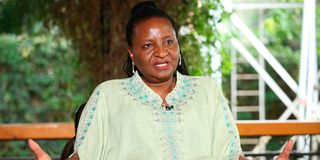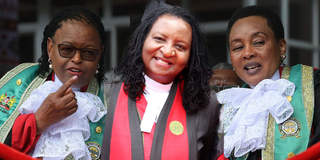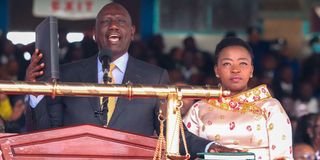
Rigathi Gachagua takes the oath of office as Kenya's deputy president in Nairobi on September 13, 2022.
| Sila Kiplagat | Nation Media GroupNews
Premium
Anne Amadi: I want to face my gold scam accusers in court
What you need to know:
- In a wide-ranging interview, outgoing Chief Registrar of the Judiciary Anne Amadi talks about the debacle while swearing in Deputy President Rigathi Gachagua.
- She also gives her assessment of the impact of the Judiciary Fund that President William Ruto zealously operationalised on his first day in office.
Anne Atieno Amadi refers to herself as Triple A during the introductory part of our interview, which could be a metaphor for the handy AAA batteries that power numerous devices.
Her tenure as the Chief Registrar of the Judiciary, which is coming to an end next month, might be compared to these batteries—she has been at the nerve centre of the Judiciary since 2014 when she took over from Gladys Boss Shollei.

Judiciary Chief Registrar Anne Amadi during the interview in Karen, Nairobi, on November 27.
Despite the Judiciary receiving the least funding among the three arms of government, she says that she has done her best to set up structures that have taken the institution from the pits of endless audit queries and ensured increased efficiency through the construction of stations all over the country.
And, like the batteries, Ms Amadi—who became a lawyer in 1989 —feels the time has come for her to get a recharge.

Chief Justice Martha Koome (left), Deputy Chief Justice Philomena Mwilu (right) and Registrar of the Judiciary Anne Amadi.
“For now, I want to rest,” she says when asked of her plans. She is currently on terminal leave ahead of her departure from the Judiciary in January after 17 years.
Following recent headlines about her alleged involvement in gold dealings, which led to her accounts being frozen, she insists she has not been kicked out.
“If I had been pushed, then I wouldn’t have had the opportunity to do my valedictory speech on Friday. And I’m still coming back on January 12 to hand over. I am leaving with my head high and with dignity,” she says.
Speaking of the gold scam, Ms Amadi notes that she is willing to fight to save her name.
“I’m waiting for my day in court and that is one of the matters I will not accept a virtual hearing. I want to be present personally and meet my accuser. I am waiting for that day and I’m prepared,” she says.
During the interview, Ms Amadi talks about the debacle while swearing in Deputy President Rigathi Gachagua.

Rigathi Gachagua takes the oath of office as Kenya's deputy president in Nairobi on September 13, 2022.
She also gives her assessment of the impact of the Judiciary Fund that President William Ruto zealously operationalised on his first day in office.
To start us off, please tell us who Anne Atieno Amadi is.
Triple A, Anne Atieno Amadi, is a mother of four, a wife, a great aunty, a child of God above all. I was born in Marsabit in the mid-sixties.
We lived in many, many places growing up. But sometime in the early seventies, my father was transferred to Kitale and my mother had to move to Kitale. So, we ended up settling there. And that is where I grew up. Most of my growing up was in Kitale, though my original home is in Siaya County.
What does the role of Chief Registrar of the Judiciary entail?
The Chief Registrar of the Judiciary is the chief administrator of the institution as well as the accounting officer, which means you are in charge of the staff, procurement, budgeting and planning, and accounting for monies. You are responsible for ensuring courts are running properly. You are in charge of ensuring that resourcing of the courts is structured.
You came in at a time when the office of the Chief Registrar was under the spotlight. There was conflict between the Chief Justice and your predecessor that played out in public. Actually your predecessor’s exit was acrimonious. How did you manage that transition?
From what I got from reading the papers, there was trouble and I needed to know what the source of this trouble was and, more importantly, what can be done to change the situation.

President Dr William Ruto takes the oath of office at Moi International Sports Centre, Kasarani in Nairobi, on September 13, 2022.
And because there was no handover of any kind, I just began by having a sit-down with all the heads of the directorates separately and all the registrars of the different courts separately to hear from them because I needed to tread carefully. I needed to be very deliberate in whichever action I was going to take, in whatever decision I was going to make. So, that is what my entry was like.
You have had the privilege of working under three chief justices—Willy Mutunga, David Maraga and Martha Koome. How would you describe the leadership of each of them?
I am very privileged to have served under three chief justices. Of course, I came in when Dr Mutunga was there. He was the kind of person that was very amiable, very, very intelligent. He did not want to get into the nitty-gritties of daily management. He was more into strategy and he had a very good team helping him with that because, remember, that is where the transformation journey began after many years of some levels of neglect of the institution.
It is a good thing that the next chief justice decided to build into that transformative journey rather than start from nowhere. His style was geared more towards better service delivery. Because CJ Mutunga had focused on institutional capacity-building, looking at increasing the numbers of judges, enhancing the budget, getting into a very ambitious infrastructural development process and all that. But CJ Maraga was looking at, “Okay, now we have this, can we focus on service delivery itself? What is the experience of the litigants when they go to court?”
Chief Justice Koome has again built up on that. We started institutional framework during Mutunga’s time, service delivery and judicial transformation during Maraga’s time and now on social transformation and access to justice. CJ Koome is looking at a more people-centred justice, access to justice through a multi-door approach. Some people can go through alternative justice systems. There are other avenues through which justice can be achieved without the necessity of the normal litigation as we know it. She is more interested in a shared leadership approach so that if you are heading a station in Lodwar, you should be a reflection of the chief justice. So she keeps reminding all sub-stations that where you are, you are the chief justice of that place.
As you make those observations, they are three different types of leadership. Under whose tenure was it more difficult?
I guess everyone has their difficult and easy parts, because there is no one you can say this one is extreme, this one is not. For Chief Justice Mutunga, he was not the type who wanted to be in office all the time, so if there was something you needed to engage immediately and directly or you’d not be able to.
Justice Maraga was more present and he was more hands-on, again which has its own pros and cons because sometimes when you are too hands-on, then you might get into a less strategic space. Because as a chief justice you need to be standing at the balcony, so to speak, and see what is happening from up there and directing without getting into the mechanics of it. So, what I can say is that I have enjoyed serving under the three chief justices. I have learnt a lot form them. I have learnt that it is exactly possible to just change with whoever is coming in as a leader.
So, when one afternoon, CJ Emeritus David Maraga came out guns-blazing and took on President Uhuru Kenyatta, in what you would say was addressing Kenyans on the state of the Judiciary. How was the atmosphere then?
I could understand his frustrations. First of all, when he went to make that statement, it was a decision he made on his own, he didn’t consult anyone.
Remember, that was the time we were facing the infamous “revisit”. That was the time we had a huge budget cut, especially our development. We are yet to recover from that action. It was very difficult to get things done because our budget was being cut and apart from the budget cut, the Exchequer releases were just not coming. And he also felt like he was being disrespected. So, I could totally understand that action, but the environment was really difficult for the institution.
You have sworn in two presidents, Uhuru Kenyatta in 2017, and William Ruto in 2022. Tell us about those experiences.
It is a very humbling experience. Of course, I swear in a lot of people every day; so again it is something routine to me. It is only that you don’t do it at that level. So, when you are carrying out an exercise like that, you are doing it as your usual job. So, it humbles you but, again, it is not something that is out of the ordinary because every day you are swearing in commissioners, tribunals, whoever.
What happened at Kasarani on September 13, 2022? We saw the Deputy President taking an oath of office different from what you were reading out ...
When we do the swearing-in ceremony, we usually have a rehearsal the day before, which we did and it went very well. But we do it in a space like this (venue of the interview) where there is quiet and order. Here, you are in a stadium that is so noisy and with so much excitement. So, you need to focus on what you are doing because the noise is too much and if you don’t focus, you could get distracted. I don’t know if that is what happened but that is what I suspected because I had my script and there was his script to help him with the words. I suspect it is the noise from the crowds that could have caused that distraction. If the oath is not taken the way it is specified, then it ceases to be an oath; so you have to do it again.
As your term ends, what would you point out as your achievements?
There are many but, bottom line, I think, just putting structures in place. Structures that will stand the test of time, structures that have propelled the institution to where it is now. Structures that have enabled us to have our digital space where it is now. Structures that have enabled us to get rid of all those audit things that we were struggling with in the beginning.
Structures that have made it possible for us to have smooth procurement that has never been questioned. Structures that have ensured equitable distribution of resources to court stations. Structures that have ensured the court buildings that are coming up are in virtually all parts of the country, without any county feeling like they have been left out.
Structures that ensure we are able to make decisions based on data, with a functioning performance unit that helps even the Judicial Service Commission make decisions that are scientific and are based on data that can be verified.
For me, that gives me a lot of satisfaction.
A number of stakeholders have raised their concern over the slow pace at which the wheels of justice are grinding. As you exit, what would you say would be a turning point as far as this issue of delayed justice is concerned?
Delayed justice is a function of resources. I have always said that as a nation, we have a very diminished view of our justice needs. Because if our budget in 2014 was Sh15 billion and today it is Sh21 billion, what are we telling Kenyans? We are telling Kenyans that you don’t need justice; that education or medical or energy are more important than justice. That is why you will find that the budgets for all other agencies have risen. Parliament, which is another arm of government operating in Nairobi, has two-and-a-half times more budget than the Judiciary.
As long as we retain that diminished view of our justice needs, there is no way we are going to deliver good justice. That is expecting too much.
So, for us to be able to deliver justice with the structures that we have put in place, we need funding. And it is not much. We are just saying that if we can have just 3 per cent of the national budget, you will see wonders because we are able to do so much with so little. And this is something that needs to be debated nationally because everything that we do, whether in business, agriculture, medical, energy, all of it is a potential source of conflict.
So, if all these other things are important, then peaceful resolution must be at the centre of it. For as long as we will not appreciate that, it is a wild expectation for the Judiciary to provide quick justice.
Talking about funding, on day one of President Ruto’s administration, the Judiciary Fund was operationalised. Has it helped in any way?
The operationalisation of the Judiciary Fund is a good thing, but we have a number of problems. Number one, the Judiciary budget is still under the Appropriations Act. The Act is July to June and it ends. As much as the Act allows us to retain the monies we have not spent from the previous year, it’s not capable of implementation because the Act requires us to stop spending on the last day of the financial year.
Number two, we have a circular that promotes the use of that fund. It has led to development of other bureaucracies that have put us in a worse position than we were before. Because now, the Controller of Budget has to appropriate the funds before we get our exchequer releases.
And what the Controller of Budget does is to pre-audit us and say what are we going to do with this money, who is going to spend it, who is involved in this activity and I want this and the other ... they want us to get quotations from court station in Bungoma explaining why the Bungoma High Court has to do a mobile court in Mount Elgon, for example. So, we are not in a good place in short and we have been engaging with the Treasury principal secretary and the Central Bank of Kenya and we hope that we are going to resolve that.
Do you have any regrets as you exit?
No, not at all. I am happy that I got this opportunity. I am grateful to the commission that appointed me and commissions that have supported me to the end. Remember, I have worked with a lot of commissioners from 2014. We have a good working relationship. I have supported them as they have supported me. We have worked with the judges and the magistrates and staff and it has been great.
Challenges that I have had? For me, I take the lessons, good lessons, because they help me to be a better person, a more careful person. I also learnt that being in a space like that you become a wrestler, whether you like or not, so you have to prepare for wrestling. And if you are not careful, you will be knocked out.
As you make sure you are not getting knocked out in this wrestling match, tell us about your “golden” headache. Of course it came up towards the tail end of your tenure.
It was terrible because it was something that was hatched both outside the Judiciary and inside it. That is what I came to learn later on.
I don’t know who was suing me, never met him and the idea was to mudsling me and try to force me to be sent away by the commission or to get me to a level where I resign. But I wasn’t going to do any of that because I don’t even know what that was.
As you leave with your head high, what is next for Ann Atieno Amadi?
I want to rest. I will probably do some work in the community that raised me, and I am looking forward to that, but for now I want to rest.
The all-female leadership at the top of the Judiciary, I mean the CJ, her Deputy Philomena Mwilu and yourself, offered a break from the many years of the male-dominated offices. Did this mean anything to you?
We have dealt with it (achieving gender parity). We are actually at 51 per cent female.
How did you achieve it?
The men are not applying for some of these jobs. Even for legal research work, you find a lot of females so that there’s even affirmative action for men. So that, if men apply, even if they are marginally good, they are taken. They are not applying. Often, you find that out of 100 applicants, 75 are women. So, we try and get all the 25 men in.
Have you considered running for political office? Are you going to run in 2027?
No, I’m never doing that. I can’t campaign, I can’t do that. I do not want to give it a try. That one I’m clear in my head, siwezi!





